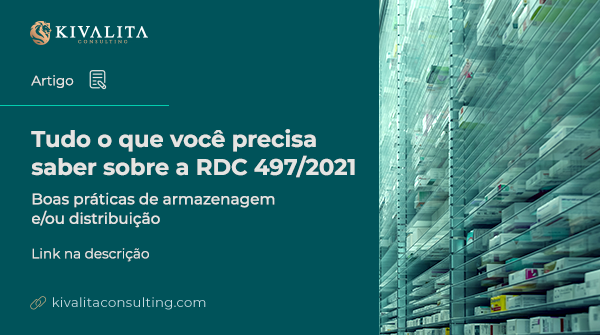RDC 497/2021, published by ANVISA, is an essential regulatory framework for manufacturers, distributors, and importers of health products in Brazil. This regulation establishes the procedures for granting the Certification of Good Manufacturing and Distribution and/or Storage Practices, ensuring the quality and safety of products in the market. Understanding the requirements and benefits of this RDC is crucial for companies seeking to comply with the quality standards required by Brazilian law.
To obtain GMP certification, companies must submit a petition form, an audit plan, and an audit report issued by an accredited auditor. In addition, it is necessary to present proof of payment of the sanitary inspection fee and the inspection report of ANVISA or recognized Sanitary Surveillance agencies. The certification process is rigorous and aims to ensure that all operational practices are in line with the standards established by ANVISA.
Structure Required to Obtain the Certificate of Good Practice
To ensure obtaining the Good Manufacturing Practices (GMP) or Distribution and/or Storage (GDP) Certificate as stipulated by RDC 497/2021, it is crucial that companies develop a robust and well-documented infrastructure.
Firstly, physical facilities must be designed to meet the specific requirements of each product, with segregated areas for different stages of the manufacturing or storage process, avoiding cross-contamination. It is essential to have a proper ventilation system, temperature and humidity control, and surfaces that facilitate cleaning and disinfection. In addition, the arrangement of the equipment must allow for efficient and safe movement, minimizing operational risks.
In addition to the physical infrastructure, the company must implement detailed Standard Operating Procedures (SOPs) for all critical activities (a robust QMS – Quality System). These procedures should cover everything from the receipt and inspection of raw materials, to the storage, inventory control, and shipment of finished products. Documentation should be accurate and easily accessible, ensuring that all employees adhere to the same operational standards. Regular trainings are mandatory to educate staff on SOPs, hygiene practices, and safe product handling. A robust quality management system, which includes regular internal audits and a process of continuous improvement, is vital for maintaining compliance and effectiveness of operations, ensuring that the company consistently meets ANVISA requirements.
An important aspect of RDC 497/2021 is the possibility of including new items or modifying current GMP certificates without changing the certificate’s expiration date. This provides flexibility for businesses to adapt their operations and expand their product portfolios without losing certification. However, it is crucial that all changes are properly audited and approved to ensure continued compliance.
To maintain certification, companies must be aware of the renewal deadlines, which must be filed between 270 and 180 days before the expiration of the current certificate. Continuous compliance with RDC 497/2021 not only ensures the quality and safety of products, but also strengthens the company’s reputation in the market. By strictly following procedures and staying up-to-date with regulatory requirements, businesses can ensure the trust of consumers and business partners.
Uncomplicating Legislation Implementation
Looking for help implementing a certification like this? Count on Kivalita Consulting specialists, we have all the necessary expertise to serve companies in the segment in an uncomplicated way, avoiding cost, waste and rework, talk to us today about your demand.


